- Home
- Linda Lael Miller
Angelfire
Angelfire Read online
Dear Readers, Old and New,
It is with joy that I give you one of the novels written earlier in my career. Some of you have read it, and will feel as though you’re meeting old friends; to others, it will offer a completely new reading experience.
Either way, this tale is a gift of my heart.
The characters in this and all of my books are the kind of people I truly admire, and try to emulate. They are smart, funny, brave, and persistent. The women are strong, and while they love their men, they have goals of their own, and they are independent, sometimes to a fault. More than anything else, these stories are about people meeting challenges and discovering the hidden qualities and resources within themselves.
We all have to do that.
We are blessed—and cursed—to live in uncertain times.
Let us go forward, bravely, with our dearest ideals firmly in mind. They’re all we have—and all we need.
May you be blessed,
Linda Lael Miller
4235 S. Cheney-Spokane Road, Ste. #1
P.O. Box 19461
Spokane, WA 99219
Books by Linda Lael Miller
Banner O’Brien
Corbin’s Fancy
Memory’s Embrace
My Darling Melissa
Angelfire
Desire and Destiny
Fletcher’s Woman
Lauralee
Moonfire
Wanton Angel
Willow
Princess Annie
The Legacy
Taming Charlotte
Yankee Wife
Daniel’s Bride
Lily and the Major
Emma and the Outlaw
Caroline and the Raider
Pirates
Knights
My Outlaw
The Vow
Two Brothers
Springwater
SPRINGWATER SERIES:
Rachel
Savannah
Miranda
Jessica
A Springwater Christmas
One Wish
THE WOMEN OF PRIMROSE
CREEK SERIES:
Bridget
Christy
Skye
Megan
Courting Susannah
Springwater Wedding
My Lady Beloved
(writing as Lael St. James)
My Lady Wayward
(writing as Lael St. James)
High Country Bride
Shotgun Bride
Secondhand Bride
The Last Chance Café
Don’t Look Now
Never Look Back
One Last Look
For Sisters-in-love:
Susan Burgess
Donna Mahar
Karen Miller
Karon Lael
and
Maureen “Mo” Hamilton
www.SimonandSchuster.com
Pocket Books
A Division of Simon & Schuster, Inc.
1230 Avenue of the Americas, New York, NY 10020
This book is a work of fiction. Names, characters, places, and incidents either are products of the author’s imagination or are used fictitiously. Any resemblance to actual events or locales or persons, living or dead, is entirely coincidental.
Copyright © 1989 by Linda Lael Miller
All rights reserved, including the right to reproduce this book or portions thereof in any form whatsoever. For information address Pocket Books Subsidiary Rights Department, 1230 Avenue of the Americas, New York, NY 10020
This Pocket Books paperback edition April 2008
POCKET and colophon are registered trademarks of Simon & Schuster, Inc.
Design: Anna Dorfman / Photo: Arunas Flupsas / Nonstock / Jupiter Images
Manufactured in the United States of America
10 9 8 7 6 5 4 3 2 1
ISBN-13: 978-1-4516-1128-1
]
ISBN-10: 1-4516-1128-5
ISBN-13: 978-1-4516-5526-1 (eBook)
]
Contents
Chapter 1
Chapter 2
Chapter 3
Chapter 4
Chapter 5
Chapter 6
Chapter 7
Chapter 8
Chapter 9
Chapter 10
Chapter 11
Chapter 12
Chapter 13
Chapter 14
Chapter 15
Chapter 16
Chapter 17
Chapter 18
Chapter 19
Chapter 20
Chapter 21
Chapter 22
Chapter 23
Chapter 24
Chapter 25
Prologue
Near Brisbane, Australia—December 1872
THE BARK OF THE ACACIA TREE FELT ROUGH AGAINST THE INSIDES of Jamie McKenna’s wrists and the midday sun burned hot, scalding his bare back. Resting his forehead against the tree trunk to which he was bound, he closed his eyes and fought back the panic that threatened to engulf him. And he waited. That was the worst part, the waiting.
“Jamie?” The feminine voice came from behind him. “I brought you some water.”
Jamie opened his eyes, and his jawline hardened. “You shouldn’t ’ave come, lass,” he said. His voice sounded hoarse, hurting as it emerged from his dry throat.
Peony came to stand boldly beside him, her enormous green eyes filled with sadness. “I have a knife,” she whispered. “I’ll cut that rope and we’ll escape, the two of us together.”
In view of what was to come, the idea was not without appeal, but Jamie knew that the master would find them if they tried running away. The punishment for such flagrant rebellion would be that much worse, and it would include Peony. “No,” he said.
Tears welling in her eyes, Peony opened a canteen and lifted it to Jamie’s parched lips. She was a beautiful woman, with her emerald eyes and golden hair. At twenty-five, she was eight years older than Jamie, and she belonged to Increase Pipher as surely as his favorite horse and the gold-handled walking cane he carried.
“I can’t bear this,” she choked out.
The water was sweet in Jamie’s mouth and it soothed his throat as he swallowed. “You’ve got to get out of’ere before someone sees you,” he muttered.
“At least let me set you free,” Peony pleaded, clutching at Jamie’s arm with one hand. Although she was agitated, her touch was cool, soothing.
“Do you know what Pipher’d do if he caught you?” he countered, in a whisper gruff with fear. “I’ll tell you, Peony: he’d do just what he’s going to do to me now—tie you to a tree and ’ave you whipped.”
Peony squeezed her eyes shut. Her slender alabaster throat worked, but no sound came out of her mouth.
“Go,” Jamie said. “Please.”
The rumble of male voices rolled on the muggy summer air like thunder preceding a storm. They were coming, the wait was over.
Jamie steeled himself for the ordeal he would face, determined to get through it without giving Pipher the satisfaction of breaking him. “Run, Peony,” he rasped, and after a moment’s hesitation, she disappeared into the trees that surrounded the small clearing.
Pipher and his men arrived seconds after the woman had gone. Jamie refused to turn his head to look back at the man who had enslaved him; the old man was forced to come and stand at his side.
Pipher smiled, showing his enormous yellow teeth—horse’s teeth, Peony called them—and the sun glinted in his snow-white hair and muttonchop whiskers. “Hello, lad,” he said, in a voice that could only have been described as cordial.
Jamie glared at his tormenter, knowing that Pipher wanted him to beg, telling him by his expression and his bearing that he’d
die first.
The plantation owner threw back his head and laughed, and Jamie felt a fine mist of saliva settle on his skin.
“God, but you’re a stubborn little mick!” the old man marveled.
Increase looked back at his henchmen, who twittered halfheartedly at his subtle cue. Jamie knew some of those men pitied him, but instead of feeling any kinship with them, he hated the lot.
Pipher lifted his cane, with its handle of beautifully molded gold, and tapped Jamie’s shoulder with it. “Where’s that quick tongue of yours now, Mr. McKenna?” he asked, his foul breath fanning over Jamie’s face and causing bile to rise in his throat.
Jamie swallowed and said nothing, and his gaze remained steady, defiant. His message was clear enough, he knew. It said: Go to hell. And Pipher understood.
“The whip,” the planter grated out, infuriated, extending one hand.
Someone came forward with the coil of black leather, and Pipher made a point of unfurling it with a sharp crack. He was skillful with the lash; even when there was no punishment to be meted out, he often practiced for hours at a time.
The rich man stepped back, out of sight, and again Jamie heard the whip crack. His stomach muscles tensed; he forced himself to let them go slack. The others had told him that it would hurt less that way.
The first lash weakened Jamie’s knees; the pain was like fire raging across his sunburned back. He made himself think of his brother, Reeve, and of the old days in Ireland as he listened to the whip being drawn back with a whoosh and then heard it slicing through the thick air again.
Sweat beaded on his forehead and upper lip as the strip of leather lacerated his flesh a second time, but he did not cry out. Not one lash or a thousand could make him do that.
He counted ten more biting slashes before the summer air went dark and his legs refused to support him any longer.
The sun was low on the horizon when Jamie regained consciousness. He was still bound to the tree, though he’d slipped to his knees, and Peony was sawing frantically at his bonds with a kitchen knife.
Jamie’s back was ablaze with pain, and the tree bark had scraped one side of his face raw. His throat was all but swollen shut and the smell and taste of blood made his stomach churn. “Go—away—” he managed to croak.
Tears were streaming down Peony’s cheeks. “Just shut up, Jamie McKenna,” she said, still slicing at the thick rope. “We’ve no time to argue—I don’t know if the blaze caught properly or not.”
When his bonds gave way, Jamie rolled to the ground, unable to hold himself upright. He was disoriented; the earth felt spongy beneath him and the sky seemed to have fallen in, thick and smothering.
“Left you here to die, he did,” Peony prattled to herself. “Boar’s bait, that’s what he called you. The devil’s waiting for that old man in hell’s front parlor, I’ll tell you that.” Jamie heard the knife thump against the ground, felt her efforts to lift him to his feet. “I’ve got a place to hide you,” she said, breathing hard from the struggle, “if you’ll—just—get—up!”
Nausea roiled in Jamie’s stomach, so ferocious was the pain. At great cost, he turned his head away from Peony and vomited.
She stroked the back of his head until the violent spasms of sickness had ceased, then began pulling at him again and yammering, “Jamie, please—you’ve got to get up—you’ve just got to—”
“I—can’t—” he rasped, willing himself to die.
As broken as he was, Jamie felt the fury surge through Peony’s body just as though the two of them were linked somehow, sharing the same emotions. “I thought you had more courage than that!” she cried. “Maybe that old beggar’s right about you—maybe you’re not worth that odd bit of brass you wear round your neck!”
The challenge gave Jamie the strength to thrust himself to his knees. He touched the beggar’s badge, given to him so long ago in Dublin, and thought of Reeve and his poor lost mother. Because he knew they’d ask it of him, he battled the dizziness that swelled around him like a dark mist and then, with Peony’s help, rose to his feet.
His friend supported him and, at the same time, led him. He could barely see, but the sound of crackling underbrush met his ears and he caught the scent of burnt sugar on the wind. “Where ... ?”
“Never you mind where, Jamie McKenna,” Peony replied, and there were tears in her voice. “Just never you mind. You and I are going to do what we should have done long ago—we’re going to put this place behind us.”
Jamie hadn’t the stamina to argue that any attempt at escaping would not only be futile but perhaps fatal as well, so he leaned on Peony and allowed her to lead him away through the acacia trees and the specterlike gums.
Just when he was sure that he couldn’t take another step, they reached a lean-to of some sort and Jamie sank facedown onto a bed of sweet straw. Peony bustled about, making noise, but he didn’t bother to look and see what she was doing. His body and his spirit screamed for sleep.
“This is going to burn like the fires of Hades,” Peony announced reluctantly, “but I’ve got to clean those wounds or you’ll surely die of the infection.”
A cry of agony exploded in Jamie’s throat when she poured what felt like liquid brimstone over his lacerated back, and then, perhaps mercifully, he blacked out.
He dreamed that he was at home in Ireland, where December brought cold winds that dampened the very marrow of a man’s bones. He was in the cottage off that Dublin alley, and his mother was there, stoking up the fire that guttered in the grate.
“You’re a good lad,” she said, over one shoulder. “Aye. No matter what Father McDougal says, you’re a good lad, Jamie me boy.”
In the dream, Jamie asked where Reeve was, and that was when his mother turned. Her face was a blank expanse of skin, with no features to be seen.
“You’re a good lad, Jamie me boy,” she said again. “Aye. No matter what—”
“Reeve!” the young Jamie screamed, terrified. “Reeve!”
“Hush now,” scolded a gentle voice from somewhere above, in the waking world. “It’s no use calling out for him. There’s just you and me now, Jamie. Just you and me.”
Chapter 1
New Zealand—August 1888
THE SHINY STEEL TINES OF THE PITCHFORK PLUNGED THROUGH the mixture of hay and straw in which Bliss Stafford had spent the night, missing her face by mere inches. Her eyes widened and a startled scream escaped her before she could stop it. She sat bolt upright in the haystack, spiky bits sticking in her cinnamon-colored hair and clinging to her coat. “Just what do you think you’re doing, you bloody fool!”
A tall, solidly built man with light hair and eyes the color of a summer sea was staring at her, obviously confounded. He was wearing a heavy coat of dark navy woolen, along with gloves and a floppy leather hat, and his breath made a plume in the frigid winter air.
“You nearly skewered me!” Bliss protested, struggling to her feet and dusting bits of straw from her shoulders. It is virtually impossible, she reflected to herself, to maintain a dignified manner when one has just slept in a pile of hay.
Hugging herself, she began stomping both feet in an effort to get warm. She hadn’t eaten since the morning before, when the last of the food she’d stolen from the refreshment table at Alexander’s party had run out, and her stomach rumbled loudly.
The farmer grinned, showing pearly-white teeth. “You’ve got some gall, lass. This happens to be my barn you’re trespassing in.”
Bliss thought she heard a faint lilt of the Irish in his voice, but she considered this only briefly. There were too many other matters that needed thinking about. Such as extracting herself from this unsettling situation. She thrust out her chin and challenged, “I haven’t hurt your stupid barn, now have I?”
This time, the man laughed outright. With a shake of his handsome head, he flung the pitchfork deftly into the hay. Bliss shuddered, thinking how easily she could have been pinioned to the floor of this isolated stable.
> “Name’s McKenna,” the farmer said, turning to walk away even as he made this announcement. It was plain that he expected Bliss to follow meekly after him. Because she was hungry and cold, she could not have done otherwise, but it was irritating to comply with an order so offhand that it hadn’t even been uttered aloud.
“Stafford,” Bliss answered in kind, bracing herself for the winter cold as they left the relative shelter of the barn. She hadn’t gotten a good look at the farm the night before, having taken shelter at a very late hour, but now she saw that it was a substantial place with a house built of white stone and sheep dotting the deep green of the hillsides. The whisper of the sea and a certain salty scent to the air told her that the water was not far away.
Mr. McKenna’s boots made a crisp sound on the board steps leading up to the porch of his house. Bliss decided that with a place this size, there must surely be a Mrs. McKenna and a covey of children. The thought filled her with a vague sense of regret.
Reaching the front door, which was made of some heavy, unplaned wood, McKenna opened it and stepped back, for all the world like a gentleman might do, to let her pass ahead of him.
With a queenly lift of her chin, Bliss proceeded into the house. The scent of meat and eggs being fried teased her nostrils and her stomach grumbled again, spoiling her attempt at nonchalance.
“Is that all the name you have, then?” Mr. McKenna asked, hanging his hat on one of several pegs beside the door. “Just Stafford?” His pale blue eyes twinkled as he shrugged out of his coat.
“Bliss,” she admitted, though grudgingly. Since her flight from Alexander’s party several days before, she’d been secretive about her name. Not that any great number of people had asked.
He chuckled and shook his head, in the throes of some private wonder, and then ran one hand through his hair. “Come along then, Bliss Stafford, and we’ll see about quieting that stomach of yours.”
She followed him, still wearing her shabby plaid coat, peering into this room and that as they passed down a wide hallway toward the back of the house. The place had a certain spartan prosperity about it; there would be few luxuries here, but nothing needful would be lacking, either.
The kitchen was spacious and filled with wintry light, and the glare dazzled Bliss so that she had to blink several times in order to see again. A lovely Maori woman was standing at the stove, cooking, and again Bliss felt a peculiar stirring of sadness.

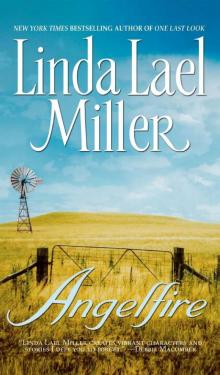 Angelfire
Angelfire Moonfire
Moonfire The Yankee Widow
The Yankee Widow The Cowboy Way
The Cowboy Way Country Strong--A Novel
Country Strong--A Novel Forever and a Day
Forever and a Day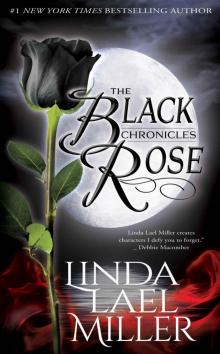 The Black Rose Chronicles
The Black Rose Chronicles Montana Creeds: Logan
Montana Creeds: Logan My Darling Melissa
My Darling Melissa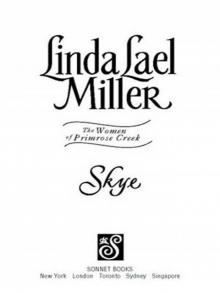 Skye
Skye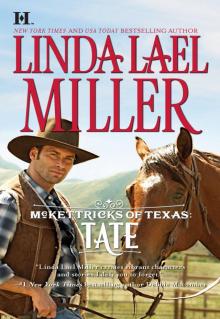 McKettricks of Texas: Tate
McKettricks of Texas: Tate Springwater Seasons
Springwater Seasons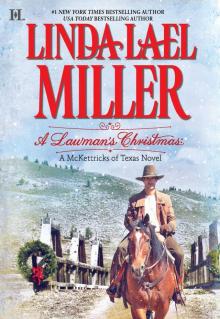 A Lawman's Christmas
A Lawman's Christmas Sierra's Homecoming
Sierra's Homecoming![Parable, Montana [4] Big Sky Summer Read online](http://i1.bookreadfree.com/i/03/22/parable_montana_4_big_sky_summer_preview.jpg) Parable, Montana [4] Big Sky Summer
Parable, Montana [4] Big Sky Summer One Last Weekend
One Last Weekend A Stone Creek Collection, Volume 2
A Stone Creek Collection, Volume 2 Tonight and Always
Tonight and Always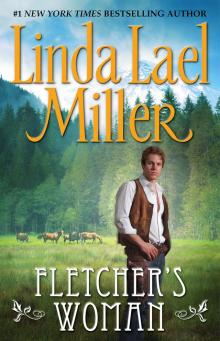 Fletcher's Woman
Fletcher's Woman A Snow Country Christmas
A Snow Country Christmas The Last Chance Cafe
The Last Chance Cafe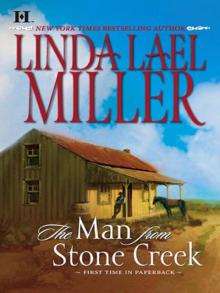 The Man from Stone Creek
The Man from Stone Creek Wanton Angel
Wanton Angel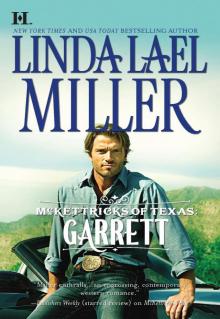 McKettricks of Texas: Garrett
McKettricks of Texas: Garrett Memory's Embrace
Memory's Embrace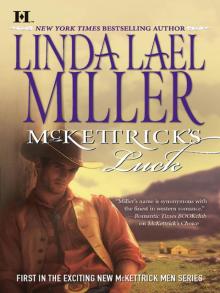 McKettrick's Luck
McKettrick's Luck Pirates
Pirates Big Sky River
Big Sky River Willow: A Novel (No Series)
Willow: A Novel (No Series) The McKettrick Legend: Sierra's HomecomingThe McKettrick Way (Hqn)
The McKettrick Legend: Sierra's HomecomingThe McKettrick Way (Hqn) Glory, Glory: Snowbound with the Bodyguard
Glory, Glory: Snowbound with the Bodyguard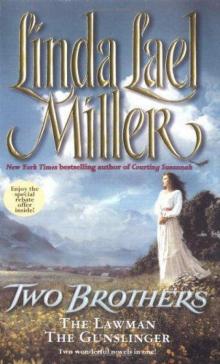 Two Brothers
Two Brothers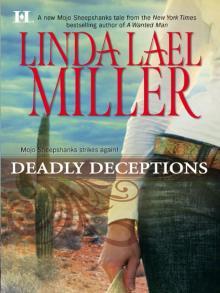 Deadly Deceptions
Deadly Deceptions Big Sky Secrets
Big Sky Secrets Garrett
Garrett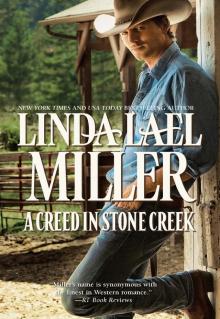 A Creed in Stone Creek
A Creed in Stone Creek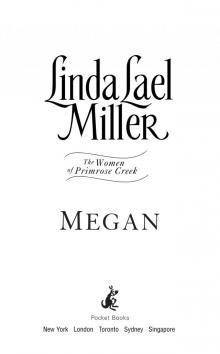 Megan
Megan McKettricks of Texas: Austin
McKettricks of Texas: Austin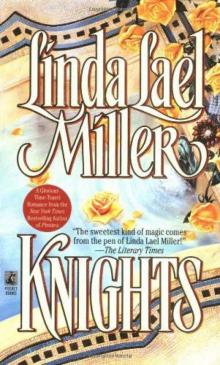 Knights
Knights High Country Bride
High Country Bride More Than Words Volume 4
More Than Words Volume 4 Glory, Glory
Glory, Glory Daring Moves
Daring Moves Lily and the Major
Lily and the Major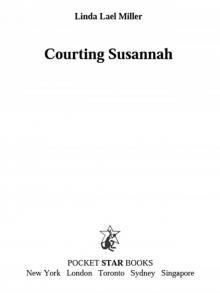 Courting Susannah
Courting Susannah Banner O'Brien
Banner O'Brien Big Sky Mountain
Big Sky Mountain Linda Lael Miller Bundle
Linda Lael Miller Bundle McKettrick's Pride
McKettrick's Pride A Stone Creek Collection Volume 1
A Stone Creek Collection Volume 1 A Wanted Man
A Wanted Man Big Sky Country
Big Sky Country The McKettrick Legend
The McKettrick Legend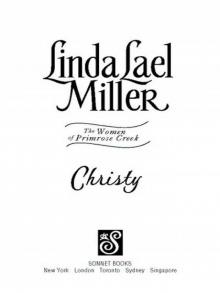 Christy
Christy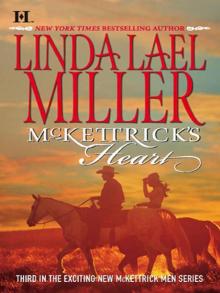 McKettrick's Heart
McKettrick's Heart Resurrection
Resurrection Arizona Heat
Arizona Heat Secondhand Bride
Secondhand Bride Snowflakes on the Sea
Snowflakes on the Sea Montana Creeds: Tyler
Montana Creeds: Tyler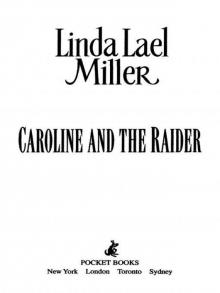 CAROLINE AND THE RAIDER
CAROLINE AND THE RAIDER A Proposal for Christmas: State SecretsThe Five Days of Christmas
A Proposal for Christmas: State SecretsThe Five Days of Christmas Yankee Wife
Yankee Wife Linda Lael Miller Montana Creeds Series Volume 1: Montana Creeds: LoganMontana Creeds: DylanMontana Creeds: Tyler
Linda Lael Miller Montana Creeds Series Volume 1: Montana Creeds: LoganMontana Creeds: DylanMontana Creeds: Tyler The Christmas Brides
The Christmas Brides McKettricks Bundle
McKettricks Bundle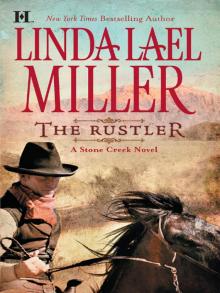 The Rustler
The Rustler Here and Then
Here and Then Only Forever
Only Forever Once a Rancher
Once a Rancher The 24 Days of Christmas
The 24 Days of Christmas Big Sky Wedding
Big Sky Wedding Emma and the Outlaw
Emma and the Outlaw Princess Annie
Princess Annie Wild About Harry
Wild About Harry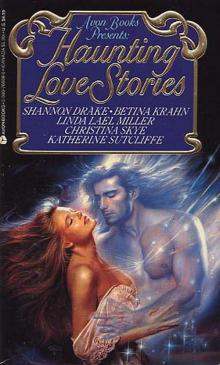 That Other Katherine
That Other Katherine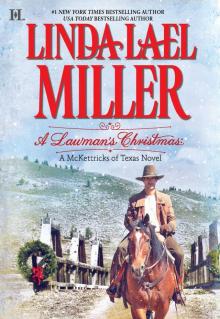 A Lawman's Christmas: A McKettricks of Texas Novel
A Lawman's Christmas: A McKettricks of Texas Novel Just Kate: His Only Wife (Bestselling Author Collection)
Just Kate: His Only Wife (Bestselling Author Collection)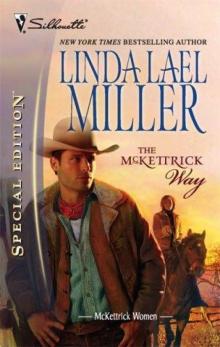 The McKettrick Way
The McKettrick Way Part of the Bargain
Part of the Bargain Taming Charlotte
Taming Charlotte Holiday in Stone Creek
Holiday in Stone Creek One Last Look
One Last Look Always a Cowboy
Always a Cowboy Batteries Not Required
Batteries Not Required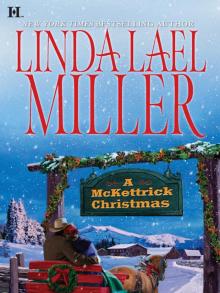 A McKettrick Christmas
A McKettrick Christmas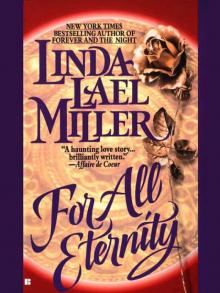 For All Eternity
For All Eternity The Marriage Season
The Marriage Season Corbin's Fancy
Corbin's Fancy The Creed Legacy
The Creed Legacy Springwater Wedding
Springwater Wedding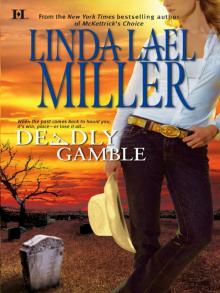 Deadly Gamble
Deadly Gamble Austin
Austin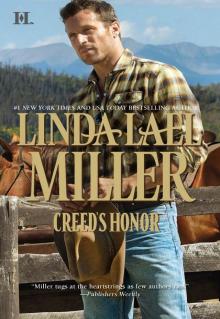 Creed's Honor
Creed's Honor A Creed Country Christmas
A Creed Country Christmas Escape from Cabriz
Escape from Cabriz There and Now
There and Now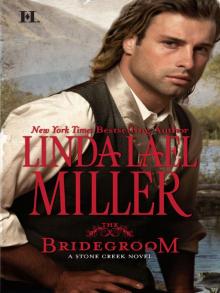 The Bridegroom
The Bridegroom State Secrets
State Secrets Bridget
Bridget